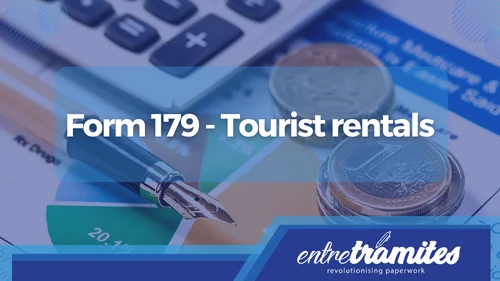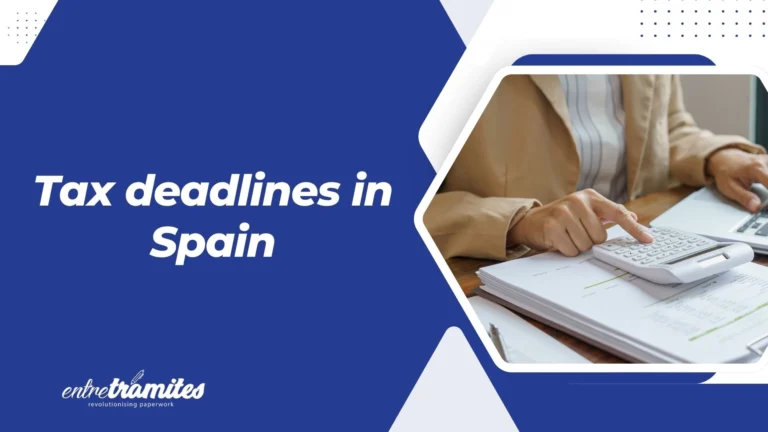What is Form 179?
Form 179 is a quarterly information declaration to the Tax Agency that affects the transfer of homes for tourism purposes. This declaration does not entail the payment of any tax and its purpose is to guarantee greater control over tourist accommodation and avoid fraud in the holiday rental sector.
Form 179 is among the models for the Income Tax Return, and obliges intermediary companies in vacation rental services, such as Airbnb, Booking.com or Vrbo, to provide information to the Tax Agency about the properties that make use of its services and its owners.
Who has to file Form 179?
According to the Tax Agency, Form 179 must be filed by “the people and entities that provide the intermediation service between the transferors and transferees of the use of homes for tourist purposes.” In other words: the responsibility falls on vacation rental intermediary platforms, such as Airbnb, Booking.com or Vrbo.
In this case, the “transferor” is the owner, who transfers the vacation rental to his guests. The assignees are the guests who use the property for the period of time stipulated in the holiday rental contract. This means that neither the “transferor” nor the “transferee” has to declare the form 179, but that the responsibility lies with the companies that act as a link between these two parties.
So, as a vacation rental owner, I don’t have to file Form 179? Exactly! Declaring Form 179 is not your responsibility, but that of the companies that, thanks to their vacation rental advertising platforms, promote properties that reach the eyes of a traveller, providing the latter with the possibility of making a reservation.
However, remember that, as an owner, you still have the obligation to declare the income derived from your vacation rental in your Income Tax Return.
How does Form 179 affect holiday rental owners?
The purpose of the implementation of Form 179 is to regulate more and better all those apartments considered tourists. If these intermediary companies communicate the tax data of all those owners who use their platforms, the Tax Agency will know which property is rented by whom, and in what way.
That said, the Tax Agency will have a much easier time detecting those holiday rentals whose income is not being fully and legally declared by their owners.
How to fill out Form 179?
If you have paid attention to the previous paragraphs, you will already know that completing Form 179 is not your responsibility. Those in charge of doing this are the platforms that mediate the transfer between host and guest, such as Airbnb, Booking.com or Vrbo.
However, so that you know what data about you is being sent to the Tax Agency, we inform you of the steps that intermediaries must take to complete form 179:
- Step 1. Submit the identification data of the owner of the rented property.
- Step 2. Submit the property identification: address and cadastral reference.
- Step 3. Obtain the contract number under which the property is rented.
- Step 4. Fill in the start date of the tourist accommodation activity.
- Step 5. Detail the income that the owner has received from the exploitation of the home.
- Step 6. Specify the transaction brokerage date
- Step 7. List the number of days the home was rented
- Step 8. Specify the payment method used to accept reservations
When the “number of days that the home was rented” and the “date of the start of the activity” are specified, a differentiation is made between the periods during which the home has been occupied and those in which it has been empty.
The importance of being clear about this distinction lies in the fact that you will also have to specify them when making the annual declaration of your vacation rental to the Tax Agency, so it is important that they are exact and correct.
When is Form 179 filed?
The presentation of Form 179 is carried out quarterly and electronically, through the Electronic Headquarters of the Tax Agency, with the deadline for presentation being the last day of the calendar month following the end of the corresponding quarter.
What happens if the obligation to file Form 179 is not complied with?
Intermediary companies that fail to comply with their obligation to submit form 179 to the Tax Agency will be committing an infraction and will most likely be sanctioned.
If the declaration is not submitted, this penalty could reach €600,000, while if it is submitted after the deadline, it could range between €300 and €20,000. On the other hand, if the data presented were not correct, the amount of the penalty would be €200. Finally, if some information is voluntarily omitted, the company must pay a fine of €20 for each information that it has not reported to the Tax Agency.
What happens if the Tax Agency detects that an owner is not paying taxes?
Although holiday rental owners do not have to do anything related to Form 179, its implementation would also entail sanctions for those owners who do not declare the income they are obtaining from renting their vacation rental properties. This is because, with the application of Form 179, surveillance will be greater, and those tourist apartments considered illegal will have a greater chance of incurring sanctions, which can be high.
Do you need more information about tax obligations?
At Entre Trámites we offer various services of management, advice, and support in bureaucratic procedures for self-employed, SMEs, and other types of companies. Contact us! Through our contact form, you can leave your details for us to call you, schedule a free consultation, or simply text our WhatsApp.





